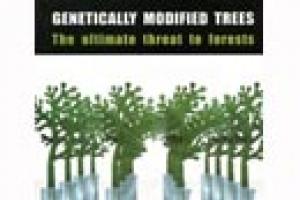The debate on Genetically Modified Organisms (GMOs) has until now largely focused on agricultural crops and much less on genetically modified trees. This is understandable, given the fact that there are already several GM crops being commercially grown in many places of the world and given that many of them are aimed at directly or indirectly feeding human beings, whose health is thus potentially threatened.
Large-Scale Tree Plantations
Industrial tree plantations are large-scale, intensively managed, even-aged monocultures, involving vast areas of fertile land under the control of plantation companies. Management of plantations involves the use of huge amounts of water as well as agrochemicals—which harm humans, and plants and animals in the plantations and surrounding areas.
Other information
3 May 2004
Maybe it's something in the water in Geneva that causes temporary memory loss. Or maybe it's the coffee. Whatever, the participants at the fourth meeting of the United Nations Forum on Forests (UNFF-4) held in Geneva in May seemed to be suffering from a form of collective amnesia.
Bulletin articles
3 May 2004
In many respects, there is very little difference between Swaziland and South Africa. Climate, topography, and geology are similar, so it is no wonder that the natural vegetation is much like that found in the South African Provinces of KwaZulu-Natal and Mpumalanga, that virtually enclose the Swazi Kingdom.
Bulletin articles
3 May 2004
In September 2003, we informed about an exotic pest which had attacked eucalyptus trees in Western Kenya (see WRM Bulletin Nº 74), and reflected on the inherent risk of the monoculture pattern.
Now, the harm has reached neighboring Uganda, with Mpigi, Luweero, Masaka, Kasese, Mbarara, Bushenyi, Mbale, Kapchwora, Tororo, Lira and Apac being the worst hit districts.
Bulletin articles
3 May 2004
Asia's forests are being destroyed at a staggering rate. China, which has become, virtually overnight, the second largest importer of logs in the world, trailing only the United States, has a lot to do with it. (The volume of uncut logs arriving in China has more than tripled since 1998 to over 15 million cubic meters.).
Bulletin articles
11 March 2004
Swaziland, a landlocked country with a population of 1,161,219 inhabitants in 17,363 sq km almost completely surrounded by South Africa, has timber as its second industrial activity after sugar.
During the Conference “Timber Plantations: Impacts, Future Visions and Global Trends” held in Nelspruit, South Africa, in November 2003, hosted by GeaSphere in association with the TimberWatch Coalition, Nhlanhla Msweli, from SCAPEI, gave a vivid testimony of Swaziland’s situation and grief linked to monoculture tree plantations.
Bulletin articles
11 March 2004
Local communities from all over Malaysia reject the country’s attempt to greenwash its timber industry. During the COP-7 meeting of the Biodiversity Convention in Malaysia in February, representatives for 253 indigenous, forest based communities presented a statement describing the Malaysian Timber Certification Council scheme, MTCC, as a scheme that "has caused, and continues to cause, the further marginalisation of our communities".
The recently launched campaign is ongoing, and signatures from additional communities rejecting MTCC are still coming in.
Bulletin articles
11 March 2004
The Malaysian Timber Certification Council scheme, MTCC, is set up to meet demands from the Western markets for a green stamp on tropical timber, and MTCC has been a pioneer among the national certification schemes from tropical countries to really invest in getting acceptance from the European market. Malaysian delegations, headed by the Minister of Primary Industries, have several times visited Europe, and the active promotion of their own scheme has worked.
Bulletin articles
11 March 2004
On 8 March, a major mobilization took place on Route BR-101 North in the Brazilian State of Espirito Santo, in the locality of São Mateus. Coinciding with International Women’s Day, and with numerous women participants, close on 600 Tupinikim and Guarani indigenous people, representatives of the Quilombos (Afro-Brazilian communities) and members of the Landless Rural Workers Movement (the well-known MST) and of the Small Farmers’ Movement (MPA, a member of the Via Campesina), occupied the highway and halted traffic.
Bulletin articles
11 March 2004
The Plantation 2020 Vision (The Federal Government's programme aimed at establishing 650,000 hectares of tree plantations in Tasmania over the next twenty years - see WRM Bulletins Nº 37, 55, 64) draws upon and extends Tasmania's violent history of dispossession, when the fate of the indigenous population was to be elbowed out of the way by Europeans.
Other information
11 March 2004
The United Nations Framework Convention on Climate Change (UNFCCC) has been in force since 21 March 1994. For a decade, international climate change negotiators have filled meeting rooms with hot air. Meanwhile, greenhouse gas emissions have increased by 11 per cent, according to World Resources Institute.
Yet when more than 5,000 participants descended on Milan for the ninth Conference of the Parties to the UNFCCC (COP-9) in December 2003, reducing greenhouse gas emissions was not on the agenda.
Bulletin articles
12 February 2004
In 2002, the Malaysian organization Tenaganita, together with Pesticide Action Network-Asia Pacific launched a study that confirmed that women plantation workers were being poisoned by the use of highly toxic pesticides, especially paraquat.
At the launching of the "Study of Pesticides Poisoning in the Plantations", Tenaganita Director, Dr. Irene Fernandez said that “If the Malaysian government had, through its enforcement agencies the Department of Occupational Safety and Health and the Pesticides Board, effectively implemented the laws the women would not have suffered."

